Voices in the Village is a fascinating account of life in a different time, in a different place. This morning, I am pleased and honored to present guest blogger Josephine Montgomery. Josephine was born in England and now lives in Missouri with her husband. She is the author of several books including Fitzgerald Hall, A Summer of Deceit, and An Unexpected Adventure. Travel with Josephine back to a small village and listen to those voices from the past.
VOICES IN THE VILLAGE
I lived in a small village in Cheshire, England. Night after night German bombers roared overhead en route to release their deadly cargo on the ports of Manchester in the north and London in the south. It was 1945, World War II was over. I was seven years old and didn’t have to carry a gas-mask to school anymore, or dash down the garden path to huddle in the dark, damp air raid shelter. Life was good.
I liked Saturday mornings, it was haircutting day; the village bustled with people. Dad stood in the horse stable waiting for Mr. Breathen to arrive on his bicycle, he’d been gassed in the First World War, but apart from having to sleep sitting upright, he led a very active life. Mr. Breathen was eighty-six years old and pedaled four miles to our house to have his hair trimmed. Gravel scrunched and sprayed under his bicycle wheels as he swooped through the garden gate into the yard. I thought he looked like an ancient warrior with his flowing white hair and bristling handle-bar mustache.
“Watch out Harry,” he’d call to Dad, “I haven’t got round to fixing the brakes.”
“You’ve been saying that for ten years,” Dad replied.
A bale of hay at the back of the horse stable brought Mr. Breathen and his ancient bicycle to a halt. After catching his breath, he un-strapped a sturdy leather bag hanging beneath his bicycle seat and handed it to me. Inside, buried beneath an assortment of wrappings, was payment for his haircut, a jar of honey collected from his beehive.
Small villages were self-reliant; responsibilities had nothing to do with expertise. If existing skills roughly matched a need in the community the job was yours, for life, and then inherited by your children. The village shopkeeper’s husband was a brick-layer, his duties were to lay out the deceased and dig their grave. Our ancestors reached back four hundred years and somewhere along the way were nominated as the village barber. Perhaps, in years gone by, my relatives sheared the village sheep. Hairstyling was not high on Dad’s list of skills. Every male in the village sported the same haircut, short back and sides. Females had two choices, long or short, level with your chin or shoulders. It was easy to tell which village a person belonged to by the cut of their hair. Mr. Breathen did not live in our village, but Dad made an exception and trimmed his flowing locks. The full-time occupation of the barber in Mr. Breathen’s village was blacksmith, he also snipped and decorated horse’s tails and manes for parades; this amply qualified him to cut the villagers hair. Mr. Breathen preferred Dad’s hair-styling. I learned later that he wore his hair long to hide the mangled remains of an ear blown off in the war. His local barber, the blacksmith, cut his hair too short which revealed the deformity.
Bicycles lined up along the hedge, villagers sat in the garden and caught up on village gossip while waiting their turn for a hair cut. A sharp rap on the windowpane summoned Mother to the open parlor window where an extended arm clutched payment. A dozen eggs, a rabbit, skinned and ready for the pot, slices of home cured bacon, money was rarely exchanged. My three brothers and I waited anxiously to see if anyone paid with candy coupons clipped from ration books. The government candy coupon allowance was four ounces per child per week which didn’t go far if you were partial to large red, sugary pear drops.
Some people chose to sit in the horse stable on empty World War II ammunition boxes while waiting for a trim. They discussed Winston Churchill’s speeches; no-one missed a ‘Churchillian’ speech. The entire village twirled the knobs on their wireless sets and children were forbidden to make noise. If wireless batteries ran dry it was quite acceptable to dash into a neighbor’s house, without knocking on the door, to continue listening.
10.30 a.m. until 12 noon each Sunday we spent in church. Dad was a ‘sidesman,’ responsible for collecting the offerings. My brother pumped the bellows for the pipe organ, uncles and cousins were bell ringers or sang in the choir. After church my brothers and I spent Sunday afternoon sitting opposite the 16th century coaching inn, waiting for Mr. Hurst to arrive with his ice cream cart pulled by Betty the donkey. When Betty trotted out of sight down the lane we waited for the American Army trucks to rumble past on their way to the U.S. air base. I assume they were supply vehicles because soldiers tossed an assortment of gifts to us. Candy, chewing gum, bars of soap and lots of toilet rolls flew through the air as the trucks sped by.
Winter was a busy time socially in the village, especially for my family. Dad was an accomplished musician and my three brothers and I each learned to play more than one musical instrument. It was taken for granted that whenever an event required music we would oblige. Occasionally booking errors occurred, one year we found ourselves hastily shuttled between the School nativity play, a senior citizen Christmas party in the village hall and an evening carol service in the vicarage.
The two hundred years old, vicarage was my favorite performance venue. Mr. Plummer, the vicar, was a small, elderly gentleman with periwinkle blue eyes, a circle of snow-white hair and very pink skin. He welcomed us into the oak paneled music room where a blazing log fire accentuated the pungent smell of yew branches decorating the mantelpiece. After carol singing, the choir, audience and my family of musicians sat around the log fire sipping mulled cider and nibbling spice cake by candlelight.
As the years passed, a new generation bought cars or used a regular bus service to shop in town. My Father died and my career took me around the world, but when I came home there was always someone waiting for the village hairdresser’s services. Miss Martha proudly told me I was the third generation in my family to singe her hair. It had never been cut and tumbled over her shoulders in a cascade of colors. Deep auburn when she was a young girl, shades of gray as she grew older and snow-white from more recent years. The candle flared and sputtered as I moved it backwards and forwards, barely touching the ends of Miss Martha’s hair. The acrid, sweet smell of burning hair filled the kitchen. Wind gusts puffed blue smoke down the chimney, swirling it around a box of chirping chicks on a cracked stone hearth. Miss Martha told me that in my Grandfather’s time, women believed their strength lay in their hair; they had the ends singed to seal it inside. Miss Martha was a wise old lady; I knew she didn’t believe her strength would leak out if she didn’t have her hair singed. She liked to reminisce about the old days in the village, and so did I.
Check out Amazon.com for books by Josephine Montgomery and also cozy mysteries by Blanche Day Manos. 
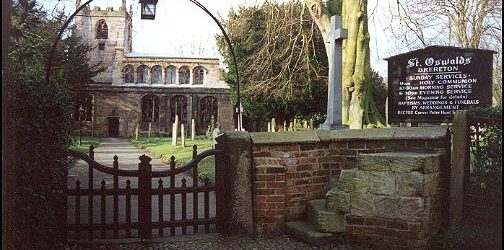
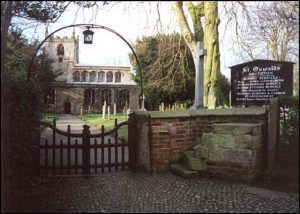
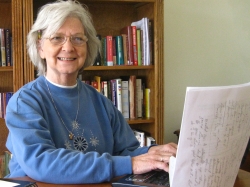
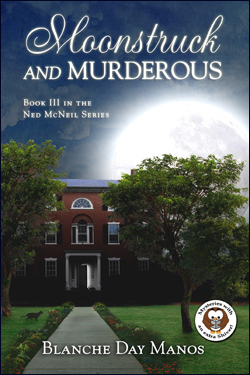
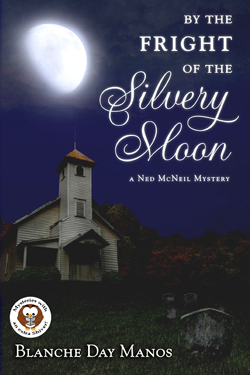
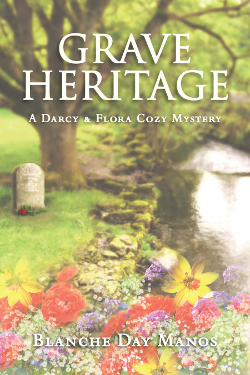
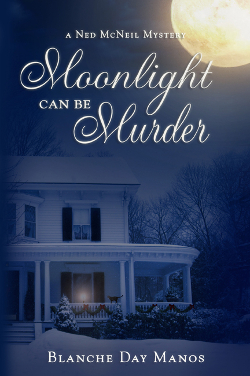
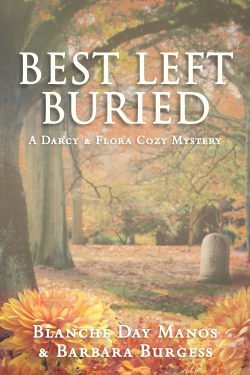
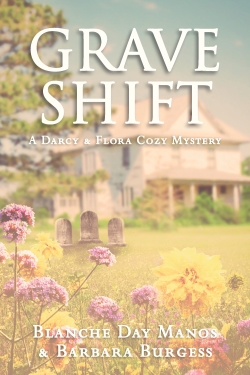
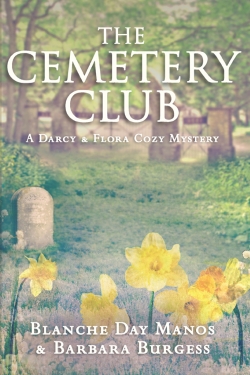
Thank you for the opportunity to post, Blanche, appreciated. In the church photo you will see a small flight of stone steps on the right, they are ‘mounting steps’, used by villagers who rode their horse to church.
Thanks for telling the readers that, Josephine! I wondered what they were. Fascinating. I so enjoyed this post.
What a lovely description of village life after WW2. Thanks so much, Josephine, for sharing with us.
Indeed it is lovely. I thought about your mom as I read it.